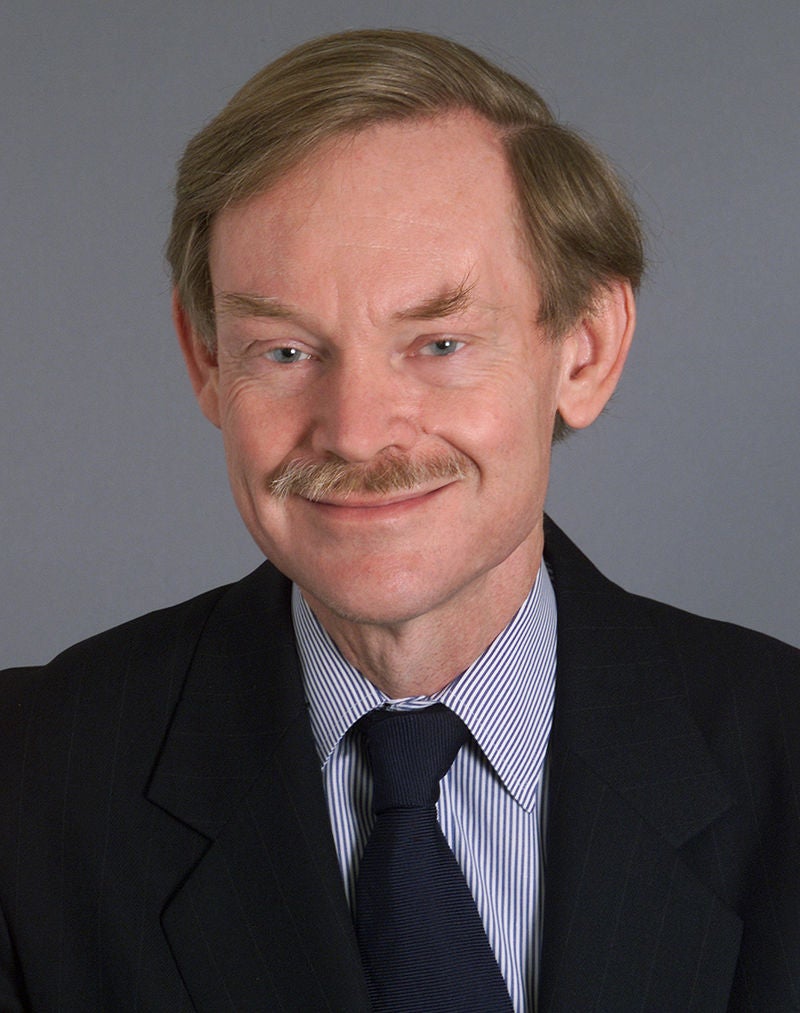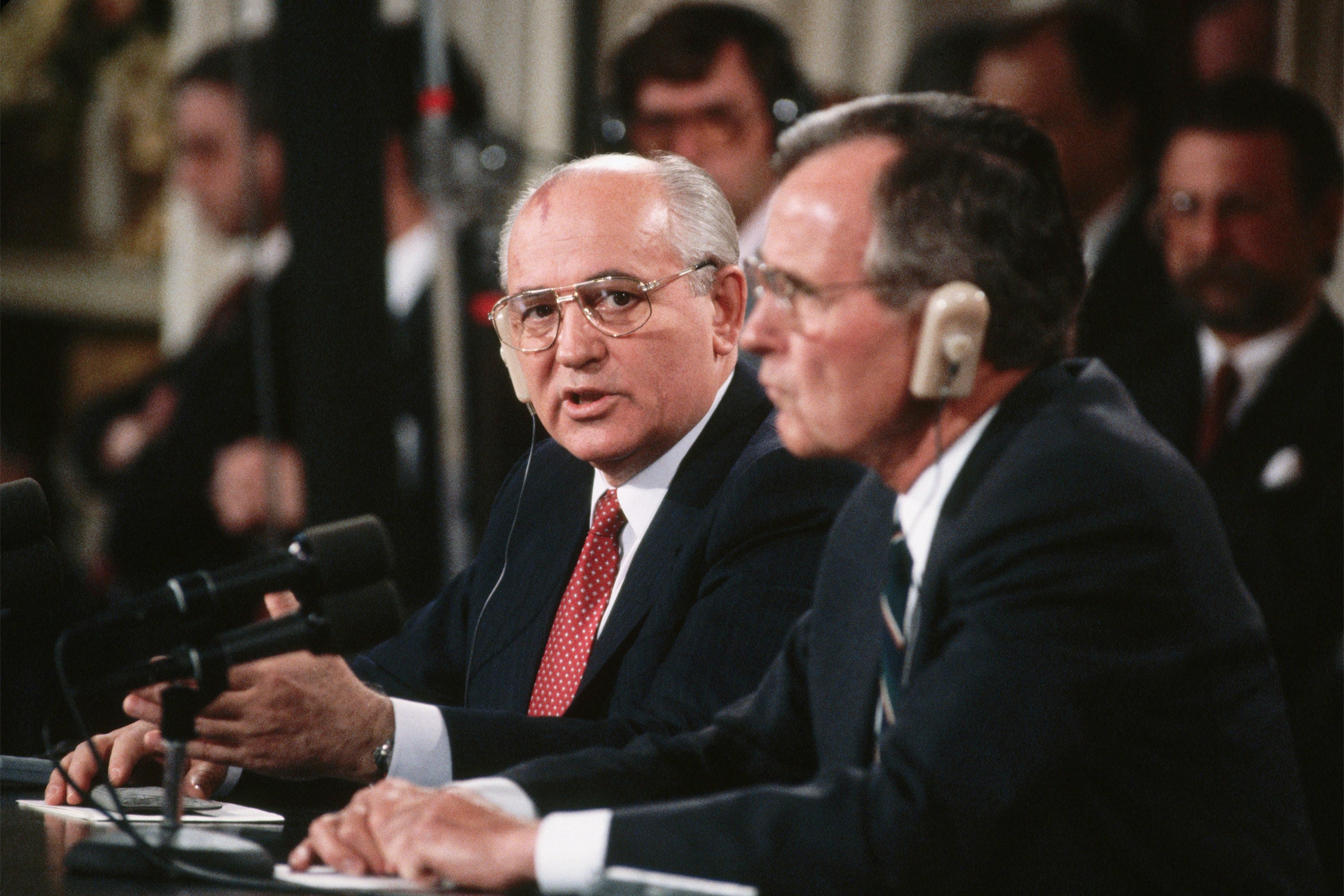When President George H.W. Bush sat down with Soviet President Mikhail Gorbachev to negotiate the peaceful end of the Cold War and the reunification of Germany, former Under Secretary of State Robert Zoellick ’81 was in the room where it happened.
During the 1990 summit, Zoellick says President Gorbachev accepted the idea of German unification within the North Atlantic Treaty Organization, based on the principle that every country should freely choose its own alliances.

“I was in those meetings, and Gorbachev has [also] said there was no promise not to enlarge NATO,” Zoellick recalls. Soviet Foreign Minister, Eduard Shevardnadze, later president of Georgia, concurred, he says. Nor does the treaty on Germany’s unification include a limit on NATO enlargement. Those facts have undermined one of Russian President Vladimir Putin’s justifications for invading Ukraine — that the United States had agreed that former Warsaw Pact nations would never become part of the North Atlantic security alliance.
Zoellick, a former deputy and undersecretary of state, deputy White House chief of staff, U.S. trade representative, and World Bank president, shared his recollections about the Cold War’s end and its ties to the ongoing war in Ukraine as part of a broader conversation with Harvard Law Today about the 75th anniversary of the Truman Doctrine, an American foreign policy aimed at containing Soviet expansion following World War II.
He is the author of “America in the Word: A History of U.S. Diplomacy and Foreign Policy.” An alumnus of both Harvard Law School and Harvard Kennedy School, where he is a senior fellow at the Belfer Center for Science and International Affairs, Zoellick believes Putin’s false claim about NATO enlargement is part of a disinformation campaign by the former KGB agent to mask his true intentions.
Zoellick vividly recalls the White House meeting he attended nearly three decades ago in which Bush asked Gorbachev if he agreed with the Conference on Security and Cooperation in Europe principle that nations are free to ally with others as they see fit. When Gorbachev said yes, he says, the Soviet leader’s “own colleagues at the table visibly separated themselves.”
Sensing the import of the possible breakthrough, he says a colleague at the meeting, Robert Blackwill, sent him a note checking what they had heard and asking if they should ask Bush to repeat the question. “Gorbachev agreed again,” Zoellick recalls, to the principle that Germany could choose to enter NATO.
Putin does not see Ukraine as an independent and sovereign state … He believes that they are all Russians, living in a greater Russia.
“The reality was that, in 1989-90, most people, and certainly the Soviets, weren’t focusing on whether the Eastern European countries would become part of NATO,” Zoellick says. Knowing Soviet and Russian diplomacy, he believes Moscow would have demanded assurances in writing if it believed the U.S. had made such a promise. And even in 1996, when President Bill Clinton welcomed former Warsaw Pact nations to join NATO, he says that, “[o]ne of the German diplomats involved told me that as they discussed the enlargement with the Russians, no Russian raised the argument that there had been a promise not to enlarge.”
But if the West never gave the promise Putin has used to explain his decision to invade Ukraine, what does Zoellick think motivates the Russian president’s decision to inflict death and destruction on one of Russia’s nearest neighbors? “Putin does not see Ukraine as an independent and sovereign state,” he says. “He has a view of Russian history where the Rus [the medieval ancestors of the people who came to form Russia, Belarus, and Ukraine] began in Kyiv. He believes that they are all Russians, living in a greater Russia. And I think at age 69, Putin feels that this is a question not only of Russian history, but his place in Russian history.”
Zoellick says that when Putin’s earlier attacks in the Crimea and country’s eastern regions failed to halt Ukraine’s drift towards the West, the Russian leader believed he had no other choice but to invade. “That’s his motivation. And I think we need to be aware that he’s going to double down. The resilience and resolve of the Ukrainian people to resist has been a surprise to him and everybody else. I don’t think he’s going to ultimately be successful. In addition to today’s brutal battles, Russia faces a difficult occupation and insurgency, even if it can seize cities and territory.”
The experienced diplomat also credits Ukrainian President Volodymyr Zelensky with rallying the Ukrainian people by refusing to flee Kyiv and through adept use of social media and language.
“We’re seeing that the skills that he developed as an entertainer and a communicator can be used in different ways, just as Ronald Reagan did,” he says. “It does raise a concern that, if something happens to Zelensky, what will that do to morale? Will he be a martyr or will his loss break the public will?”
The resilience and resolve of the Ukrainian people to resist has been a surprise to Putin and everybody else. I don’t think he’s going to ultimately be successful. In addition to today’s brutal battles, Russia faces a difficult occupation and insurgency, even if it can seize cities and territory.
Zoellick also notes that, as the war in Ukraine has garnered the world’s attention, many of the questions being asked today about the West’s relationship with Russia are similar to those he had dealt with at the end of the Cold War, including “Russia’s sense of whether it feels like a great power or threatened by NATO … those are the issues that are at very much at play in dealing with Ukraine.”
“Can Russia forge peaceful, constructive ties with the West?” he asks. “Failed economic and political reforms left Russia behind. Its economy depends on energy production. Putin played off public frustrations, but many Russians don’t want war and isolation.”
When thinking about global diplomacy and the factors that might have led to the Russian invasion, Zoellick harkens back to a comment made by his boss for eight years, James Baker, who served both as secretary of state and the treasury, as well as White House chief of staff: “As you address the problems of one era, you’re often planting the seeds for the next set of challenges. History doesn’t stop.”
More than 30 years after the fall of the Berlin Wall, Zoellick says the legacy of decisions made at the end of the Cold War are echoing throughout Europe today: “Would we keep NATO alive? Would it enlarge into Central and Eastern Europe? How far? What would be the effects on Russia of its loss of empire?”
“That leaves the question of whether the U.S. could have avoided Russia’s turn,” he says. The answer, he believes, depended on Russia’s choices. “Certainly, we wouldn’t have wanted East and West Germany to remain divided.” The related questions are many: What if Eastern European countries had been barred from joining NATO and therefore remained, like Ukraine, outside the western security umbrella? And how would they react to the Russian threat and being left again as “lands between” Germany and Russia? The U.S. and Europe, he notes, offered Russia partnerships, but Russia felt humiliated by the loss of its empire.
“I was the U.S. negotiator for German unification,” he says. “We wanted to make sure that a democratic Germany was unified in NATO. I don’t think anybody would think that’s a bad idea today. And if anything, we’re now seeing Germany stepping up to a security role for NATO and the European Union.”
In 1989-90, Zoellick was also focused on the idea that Poland — long subject to invasions by Russia and Germany — should be able to eventually join NATO. He made sure that the treaty on German unification kept that possibility open. “Given Putin’s behavior, can you imagine what the effect would be on Poland today if it weren’t in NATO? I think it’s wise to have Poland and Germany on the same side. The Baltic countries were a tougher choice for NATO, not because they don’t deserve the security, but they’re very hard to defend.” Nevertheless, he adds, because the Baltic states are now NATO members, he believes we must “take serious steps to defend them from both direct and hybrid threats.”
Ultimately, he believes supporting Ukraine economically and supplying arms for self-defense, rather than opening the potential for eventual NATO membership, would have been a better approach than the one the West has taken in recent years.
“If NATO gives a security guarantee, it has to mean it,” he says. “It has to be serious about providing deterrence under Article Five of the North Atlantic Alliance treaty. … I support Ukraine’s economic reforms and its democracy, [but] I doubted that the American people were ultimately willing to fight for Ukraine. The worst thing to do was to suggest Ukraine might join NATO, but without a serious pathway to membership.”
The U.S., he adds, “isn’t going to defend everybody all the time, everywhere in the world; we have to know what we will and won’t defend. Having said that, I think the Obama and Trump administrations erred by not giving more military support to Ukraine. I believe that we should help the Ukrainians defend themselves. But those are the exact issues debated today.”
